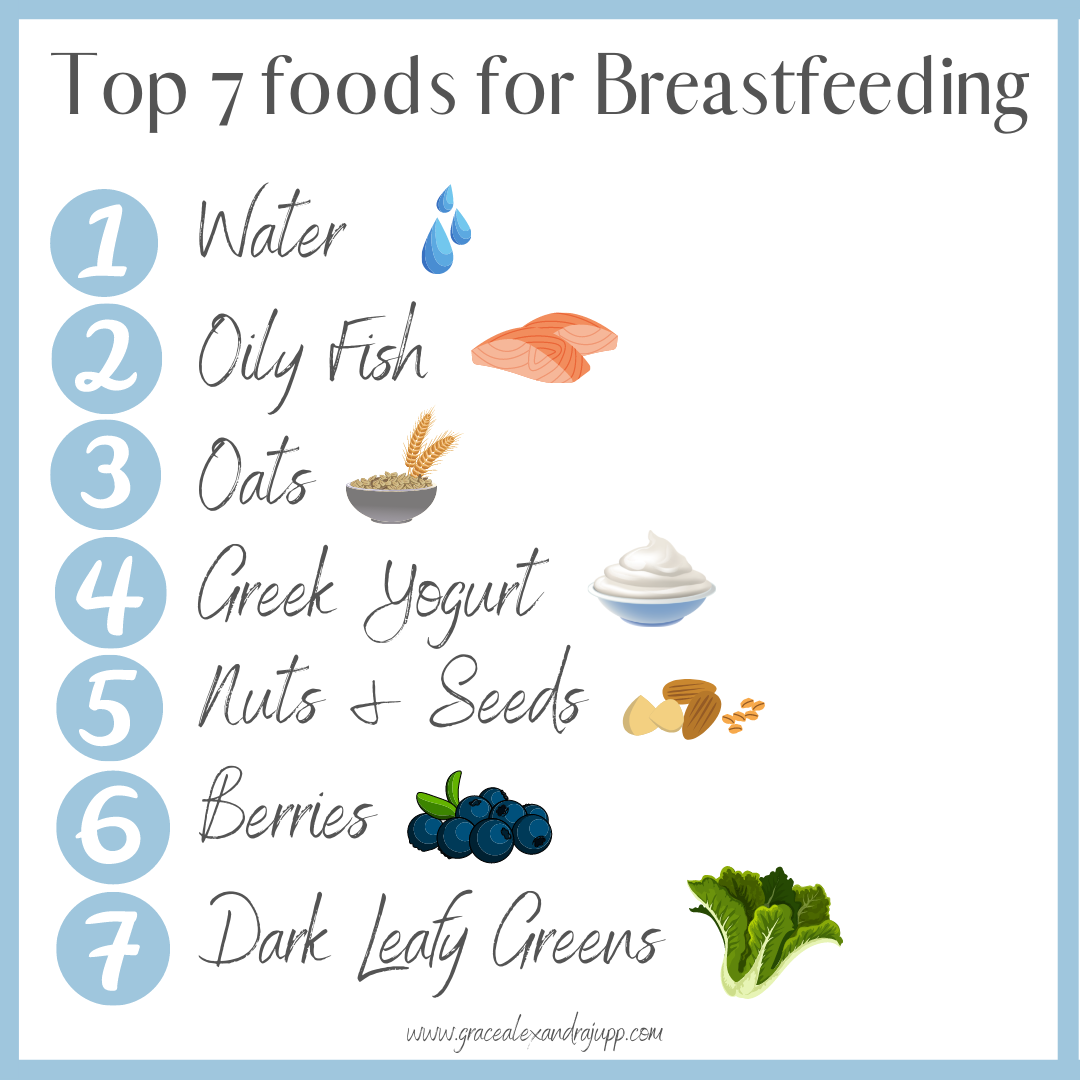Top 7 foods for Breastfeeding
Breastfeeding, especially in the early days before your supply becomes established (around 3-4 months pp), your metabolism ramps up as your body works hard to constantly and consistently produce breastmilk.
My top foods for this period of postpartum life are nutrient dense as well as being versatile and easy to prepare. None of us have time to be whipping up maca, matcha, unicorn breath smoothies right?!
Now is not the time to be focusing on restriction but making smarter choices to best nourish yourself.
Let us kick off by saying the science backed research on certain foods actively increasing your breastmilk supply is somewhat inconclusive and mostly based on anecdotal evidence than anything else. Despite this there are certainly a number of nutrients that will help to support energy and the body whilst it works overtime to produce milk of quality and potentially quantity.
Water:
Ok, maybe not a food as such but certainly the most important nourishment for the breastfeeding Mother. Breast milk is nearly 90% water and although you do not need to drink in excess of your thirst, it is recommended that you aim for close to 4 litres per day.
Foods and all beverages count towards your fluid intake, but it is a good idea to drink a glass of water before and after nursing or pumping to keep your hydration levels topped up throughout the day.
Oily Fish:
Omega 3, DHA and EPA are vital nutrients, expressed in breastmilk that work to support baby’s brain development and nervous system. Oily fish such as salmon and mackerel are rich in these nutrients as well as a great source of protein, again a vital component of a healthy diet.
Where possible, I do advise sourcing wild fish both for the health of the oceans and the health of the fish itself.
Oats:
Often the poster child for breastfeeding diets, oats are considered a ‘galactagogue’; which is a substance that promotes lactation. Whilst the evidence based research is limited here, oats are packed full of benefial nutrients to help support breastfeeding. From slow release energy to iron and folate as well as being fibre rich, porridge made from oats is a great way to start the day or as a satiating snack.
Greek Yogurt:
Unless you avoid dairy, I always recommend including a good quality full fat greek yogurt into your diet when breastfeeding.
You need to consume upwards of 1000 miligrams of calcium per day when breastfeeding, and greek yogurt as well as helping on your way to achieving this, is also a great protein source, super versatile and easily available too.
Nuts and Seeds:
Nuts and seeds might be small but they are incredibly mighty. Their benefits to health range from being packed full of vitamins and minerals such as iron, calcium and zinc as well as vitamins B&K. In addition they are a great option for adding in healthy fats and gut friendly fibre, both important for the postpartum Mother.
Almonds, flaxseeds and pumpkin seeds are my personal favourites, with almonds being hailed for centuries for their aid in supporting lactation.
All the berries….especially the blue ones:
Fruits should never be avoided when part of a healthy balanced diet and they are great for breastfeeding mums. Not just for their health benefits but they make for a great sweet snack too.
Blueberries are a particular favourite as they are incredibly rich in antioxidants and although the exact amount is yet to confirmed, these immunity supporting nutrients do cross into breastmilk.
Dark leafy greens:
Examples such as spinach, kale and broccoli are all considered rich in vitamins and minerals vital to a healthy diet. There is also some evidence that these bitter tastes will cross over to the breastmilk and help baby to accept these foods later down the line when weaning.
Finally…
Be kind to yourself during this journey. Stress and depression can greatly effect milk production, now is not the time to add to your already demanding schedule. And, remember to eat, not every single one of these foods need to make it into your daily diet but keeping your energy levels topped up with readily available calories will reduce the bodies stress response to hunger.
Try kicking off your day with a bowl of porridge, which you can pack with oats, seeds, and berries; already ticking off 3 of the foods mentioned above.



